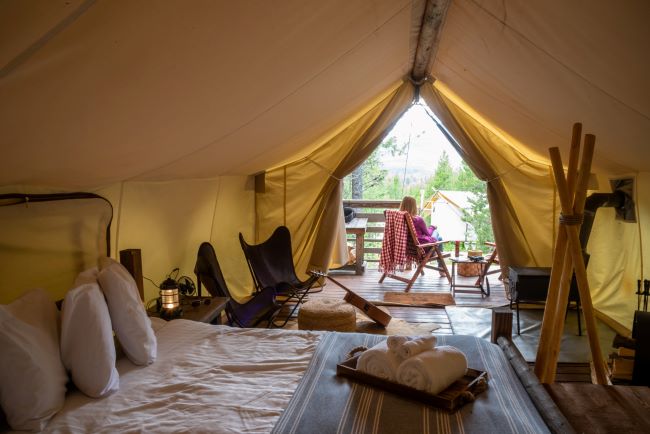Is it time to add glamping to your diversification portfolio?

The rise of the staycation, amplified by restrictions on travel during the pandemic, has seen ‘glamping’ becoming an increasingly popular choice for farmers and rural landowners when looking for options to diversify.
In 2021, glamping experienced a significant boom as holiday makers opted to stay in the UK and looked for alternatives to fully booked hotels or self-catering accommodation.
Now more farms are expected to take advantage of the trend as they look ahead to summer opportunities once again.
In fact, there is also likely to be a pent-up market for Easter vacations, and for a long weekend around the double Bank Holiday for the Queen’s Platinum Jubilee, with Thursday 2 June and Friday 3 June both designated as public holidays. So, even in winter, it’s never too early to consider options.
A report in Farmers Weekly suggested a glamping business can achieve a return on investment within its first two years – which certainly makes it a serious consideration for framers who want to earn an additional income from their land.
So, what is the secret to making a glamping business a success?
As always, good service and high standards are vital to attract customers, but the first step is to consider what type of accommodation to offer.
The choice ranges from yurts, which are some of the cheapest options, to weatherproof pods and log cabins.
For those prepared to invest more, pods with higher start-up costs but lower maintenance costs – and longer shelf life – are a great option.
For a quicker return on investment, luxury canvas tents – which typically last between five and 10 years – are a viable alternative. But rural businesses should take into account that maintenance may be required and that the British weather could be a threat to longevity.
One key aspect to consider is whether you want a seasonal summer offering for glampers, or one which can bring in funds throughout the year.
An insulated pod or log cabin will have a longer season.
The art of luxury
One of the significant aspects of the glamping market is that consumers are prepared to pay more for higher levels of comfort. The sector attracts people who are not regular campers and have a romantic vision of what sleeping under the stars will mean for them.
Some of the most successful glamping sites have taken luxury camping to a new level, appealing in particular to couples.
Extra personal touches such as hampers of local produce, bicycles for guests to use, or even hot tubs and outside fire pits resonate with the market.
Getting the business model right
A glamping site on farm and or in the grounds of country houses sounds like an uncomplicated model. But there are a range of things to consider in advance.
These include:
Start-up costs – including the price of accommodation, facilities, extras and connecting to services.
Planning – a planning application may be required. Avoid protected natural areas, green belt land and areas that might flood.
The right insurance – there will be a range of new risks to cover when venturing into hospitality and opening a farm or land up to the public: for instance, a guest may injure themselves or damage the glamping accommodation. It is important to ensure any limits on your Public Liability insurance are set at the right level in relation to the new risks. Litigation in this field can prove expensive. Speak to A-Plan Rural to see how we can help.
Risk assessment – every business model requires a robust risk assessment, one which takes account of safety and compliance as well as weather, liability or finance-related risks.
Cleanliness – now more than ever the need for cleanliness is clear. Make sure you keep accommodation spotlessly clean
Talk to our rural experts before starting a glamping business. They have vast experience and guide you through many of these issues. When done well, and planned well, glamping can be an excellent and lucrative diversification option for farmers and rural landowners.
Get in touch
To speak to a member of our specialist team call 01234 230295. Or email bedford.rural@aplan.co.uk.







